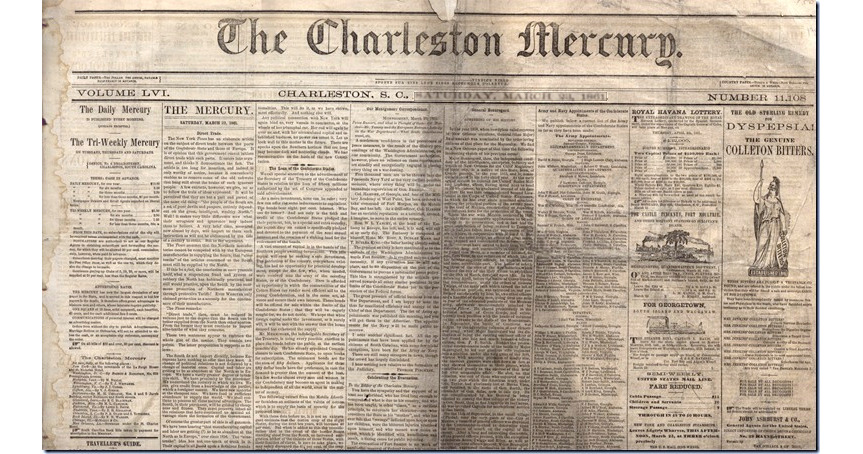February 13, 1863, The Charleston Mercury
(CORRESPONDENCE OF THE MERCURY.)
RICHMOND, Monday, February 9.
Of course the Yankees will cry down the raising of the blockade as a mere nothing. The Herald quotes ORTOLAN, Sir WM. SCOTT, KENT, D’HAUTEFEULLE and others, and concludes adversely to their opinions. The Yankee Government say they intend to raise the blockade in a way not altogether gratifying to the rebels. That’s the way they always talk. We shall see what we shall see. But let Charleston look to herself.
Reports brought to Port Hudson by deserters, with regard to disaffection in Banks’ army, are confirmed in a great measure by private advices received by our Government. The case is much the same with Grant’s army. Fighting with, and for Sambo, don’t agree with Yankees, and especially Western men. Still there are to be two tremendous fights, perhaps four; for it is evident that Hooker is chafing at the mud manacles that bind him, and the aim of the Cabinet at Washington will be to push forward all their armies at once. So we may expect to hear from Rosecrans as well as Hooker, if weather and roads permit, which is not likely, for this warm day must surely bring rain. Has the conscript law been yet executed? Are we to suffer as last Spring for the want of troops?
The lady ambassador from the Northwest is said to be the wife of a distinguished citizen, and brings excellent letters. Her object is not definitely stated. We should take care. The lady may be all right, but her Yankee friends would sell themselves and us at a moment’s notice. Boileau, the Philadelphia editor (originally a Jakey, and incapable of writing the article which occasioned his imprisonment), sold himself. Heaven and earth were being moved in his behalf – Lincoln got alarmed, sent him five or ten thousand dollars in gold; he jumped at it; and so the friends of constitutional freedom, who were laboring in his behalf, were nonplussed and disgraced. This I get from a gentleman who has known Boileau from boyhood.
A writer in the Whig proposes to reduce the currency by appreciating instead of depreciating it; that is, by extending the time for funding the first issues in 8 percent bonds to the 1st of October next, by which time it is supposed these bonds will be 12 or 13 percent above par. It is physically impossible to fund the outstanding circulation by the first of May; the bonds cannot be signed fast enough.
The editor of the Whig calls the attention of Congress to the imperfections in the law on privateering. It seems the President did not return an important bill on this subject before the adjournment of Congress. It is an arm that might have been most powerful. There are parties here anxious to engage in privateering – among them a gallant young Englishman, thoroughly skilled in seafaring, and familiar with all parts of the globe.
HERMES.
